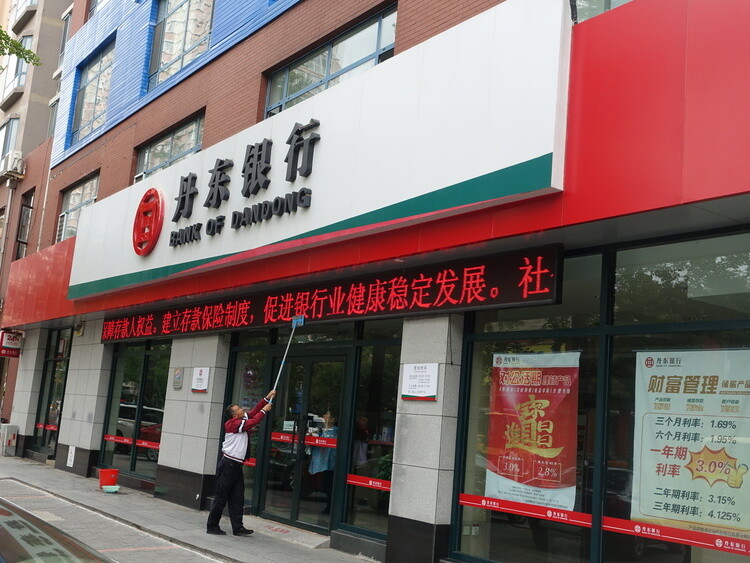hankyoreh
Links to other country sites 다른 나라 사이트 링크
Chinese banks suspending the opening of accounts for North Koreans

The US’s announcement of plans for additional pressure on Pyongyang amid discussions toward a new UN Security Council resolution after North Korea’s sixth nuclear test is drawing new attention to the issue of North Korean citizens unable to conduct bank transactions in China.
Japan’s Kyodo News reported on Sept. 10 that the Bank of China and other large-scale Chinese banks were “confirmed to have suspended the opening of new accounts in North Korean names, as well as remittances and other transactions involving existing accounts.”
The agency also quoted a source knowledgeable on North Korea-China relations as saying the transaction restrictions “have been introduced gradually since last year, and were implemented last April in Liaoning Province, which is a base for North Korea-China trade.”
Dealings with North Koreans were also reportedly suspended in Jilin Province’s Yanbian Korean Autonomous Prefecture by the Bank of China, China Construction Bank, Agricultural Bank of China, and other large banks, which a bank official was quoted as attributing to “international sanctions against North Korea.”
The inability to conduct normal bank transactions between North Korea and China is nothing new. As they have expanded to global stature with the Chinese economy’s rapid growth, the country’s banks have been leading the way in eliminating the possibility of involvement in North Korean funds and the potential for problems amid international pressure for sanctions. A case in point came in 2013, when the Bank of China suspended its transactions with the North Korean Foreign Trade Bank – North Korea’ primary foreign exchange bank – following the North’s third nuclear test. The move was not based in a UNSC resolution, but diplomatic observers concluded it was an independent move by the banks rather than a measure adopted by the Chinese government.
Trade industry insiders also said different alternatives were being sought for large-scale North Korea-China trade transactions in light of the situation.
“In some cases, Chinese businesspeople are setting up accounts at Chinese banks in their own name and handing them over with a bank card,” a source told the Hankyoreh. “This rules out the potential for it to fall under any form of sanctions.”
Another source noted, “Payment is often done in cash, which has a drawback in that you can’t do any large-scale transactions that way.” Some examples of bartering, or the swapping of goods with equivalent value, were also reported.
Some observers have cited these developments in raising questions about the efficacy of financial sanctions against the North. The latest resolution draft by the US includes financial sanctions, among them a freeze on overseas financial assets. In late June, the US designated China’s Dandong Bank as a “money laundering concern” and announced sanctions against it, but analysts also noted that it was a small local bank unlikely to have many transactions with the US.
Other observers claim the financial sanctions are reaping some of the desired results. Kyodo News reported that “North Korea’s inability to pay has resulted in a steep decline in exports of petroleum products from China,” citing Chinese customs figures as showing exports of kerosene, gasoline, and other non-crude oil petroleum products totaling 19,700 tons between May and July – down 75% from last year. A source told the agency that the “obstacles created with large petroleum transactions due to bank regulations were an important factor.”
The agency also suggested a spike in the price of gasoline in Pyongyang this past spring may have been the result of these measures, which may be seen as a form of independent sanctions by China.
By Kim Oi-hyun, Beijing correspondent
Please direct questions or comments to [english@hani.co.kr]

Editorial・opinion
![[Column] How opposing war became a far-right policy [Column] How opposing war became a far-right policy](https://flexible.img.hani.co.kr/flexible/normal/500/300/imgdb/original/2024/0702/5017199091002075.jpg) [Column] How opposing war became a far-right policy
[Column] How opposing war became a far-right policy![[Editorial] Korea needs to adjust diplomatic course in preparation for a Trump comeback [Editorial] Korea needs to adjust diplomatic course in preparation for a Trump comeback](https://flexible.img.hani.co.kr/flexible/normal/500/300/imgdb/original/2024/0702/9717199086060096.jpg) [Editorial] Korea needs to adjust diplomatic course in preparation for a Trump comeback
[Editorial] Korea needs to adjust diplomatic course in preparation for a Trump comeback- [Editorial] Silence won’t save Yoon
- [Column] The miscalculations that started the Korean War mustn’t be repeated
- [Correspondent’s column] China-Europe relations tested once more by EV war
- [Correspondent’s column] Who really created the new ‘axis of evil’?
- [Editorial] Exploiting foreign domestic workers won’t solve Korea’s birth rate problem
- [Column] Kim and Putin’s new world order
- [Editorial] Workplace hazards can be prevented — why weren’t they this time?
- [Editorial] Seoul failed to use diplomacy with Moscow — now it’s resorting to threats
Most viewed articles
- 110 days of torture: Korean mental patient’s restraints only removed after death
- 2[Editorial] Korea needs to adjust diplomatic course in preparation for a Trump comeback
- 3Nine dead in Seoul after car plows into pedestrians
- 4[Column] How opposing war became a far-right policy
- 5Korea to create dedicated population strategy ministry to combat low birth rate, aging society
- 6Samsung Electronics workers to go on first strike in company’s 55-year history
- 7Son Heung-min’s father, brother accused of child abuse at football academy
- 8[Editorial] Silence won’t save Yoon
- 9Japan is building a military meant for more than self-defense — and has the US to thank for it
- 10Dreams of a better life brought them to Korea — then a tragic fire tore them apart